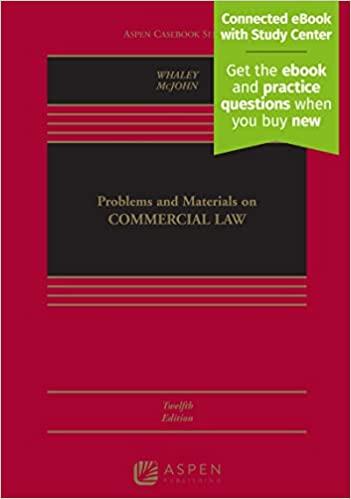Question
Martha inherited a set of collectible trains.She believes the trains and all of the accessories are authentic Fast Track trains.Fast Track is regarded as the
Martha inherited a set of collectible trains.She believes the trains and all of the accessories are authentic "Fast Track" trains.Fast Track is regarded as the best brand of collector train items.Martha knows that similar collections in good working condition have sold for $15,000.The entire set includes 100 total pieces, all of which are engraved with sequential numbering for authenticity.Martha has never set up the trains to test whether they still operate in good condition - all of the pieces have been in boxes for over ten years since the day she inherited them.
Martha holds a yard sale and decides to sell the train set.Fred, a neighbor, is riding by on his bike and stops to browse the yard sale.Martha agrees to sell the entire set to Fred for $20,000.Fred, like Martha, knows very little about collectible trains, but he believes the trains will continue to increase in value over time.Fred agrees to buy the entire set for $20,000, payable $10,000 up front and $10,000 in three months.Fred gives Martha a check for $10,000 that day.Martha drafts an invoice showing $10,000 paid and $10,000 due in three months.She and Fred both sign the invoice.
Due to the number of boxes and the fact that Fred rode his bike, Martha agrees to deliver all of the boxes within five days.She delivers all of the boxes the very next day following the yard sale.
Fred is busy, so it takes him two months to set up the trains.Once Fred sets up the trains at his house, he discovers that two pieces out of the one hundred total pieces are not "Fast Track" pieces; instead, they are generic replicas.Fred researches online and learns that the cost to replace the two inauthentic pieces is $250 total. Fred refuses to pay the last $10,000.He believes the whole set is worthless given the two missing pieces.
Assume for the purposes of this question that an enforceable contract was formed.Assume further that the invoice drafted by Martha and signed by the parties included a provision that made clear that Martha was selling the train and all accessories "AS IS" and that Martha was making no representations and warranties as to whether the items are authentic "Fast Track" trains.Can Fred seek to avoid the contract on the grounds of mutual mistake?
Step by Step Solution
There are 3 Steps involved in it
Step: 1

Get Instant Access to Expert-Tailored Solutions
See step-by-step solutions with expert insights and AI powered tools for academic success
Step: 2

Step: 3

Ace Your Homework with AI
Get the answers you need in no time with our AI-driven, step-by-step assistance
Get Started


